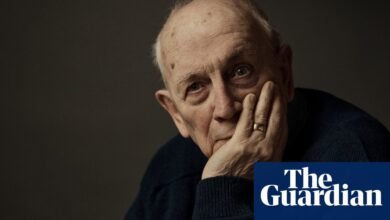The best translated fiction – review roundup | Books

Fathers and Fugitives by SJ Naudé, translated by Michiel Heyns (Europa Editions, £14.99)
“Writing fiction is a disruptive compulsion,” says Daniel, “the last refuge of someone who cannot do anything useful.” Daniel, a gay South African writer living in London, has “tended to blindly pursue my own interests”; Naudé delights in putting him in tricky situations – and I delighted in reading about them. He shacks up with a couple of odd Serbs; he attends his dying father, a man who once “never let him finish a single sentence without interrupting”, and is now largely silent; he reluctantly goes to Japan with his cousin. The results are coolly funny, frequently surprising and in parts almost overwhelming in their emotional force. The division of Daniel’s life into discrete parts gives a rich story arc for such a short book. Some of the plot points land with a bit of a thud, but the quality of Naudé’s prose and his dry vision of the world make this a late entry for one of the best novels of the year.
Untold Lessons by Maddalena Vaglio Tanet, translated by Jill Foulston (Pushkin, £16.99)
It is 1970 in the northern Italian city of Biella, and a teacher has gone missing. The disappearance of Silvia seems to be linked to the death of her pupil Giovanna, a girl who was beaten at home and responded first by “rip[ping] the hair from her calves with duct tape”, and then by filling her pockets with stones. “They found her three kilometres downstream.” We follow Silvia to her hiding place in the forest, where local people’s fears that she is “half dead with hunger and off her head” may not be far off the mark. Meanwhile, another pupil, Martino, determines to find her. Tanet’s skill is to use short chapters shuttling between characters to create a matrix of voices, relationships, gossip and guilt. But in a book full of upended expectations, the most surprising detail is that it is all based on a true story.
A Man With No Title by Xavier Le Clerc, translated by William Rodarmor (Saqi, £10.99)
Le Clerc’s father, Mohand-Saïd, was a young child when Albert Camus visited Kabylia in Algeria in 1939 and wrote about the poverty there; Le Clerc uses Camus’ essays to inspire a fictionalised account of his father’s life. The story takes in the typhus epidemic of 1943, the violence during Algerian independence protests (“an executioner cut the noses of half a dozen peasants because they ‘smoked like settlers’”) and Mohand-Saïd’s move to Marseille. Le Clerc is unsentimental about his father’s weaknesses, such as “the six thousand quills” of his anger, and Le Clerc’s own childhood experiences of homophobia are woven in (“I was ‘eighty percent poof’ when I wrote poems … but only ‘twenty percent poof’ when I was manly enough to carry six packs of UHT milk”). The result is a loving tribute both to a father and to the author’s joy in language, and the only failing is that there isn’t more of it.
Command Performance by Jean Echenoz, translated by Mark Polizzotti (NYRB Classics, £15.99)
When the day starts with a bolt “the size of a hair dryer” falling from a satellite and killing your landlord, you know it’s going to be a strange week. And so it transpires as the never-predictable French author (Piano; Ravel; I’m Off) turns to crime with the story of a sacked flight attendant who sets up his own investigation agency. Parisian Gérard Fulmard may not be well equipped for the role, even though he has bought “two new Bics” in preparation: his makeshift desk is a plank, he forgets to ask his first client her name, and his “excess embonpoint” slows him down when escaping through windows. He gets tangled up in a case involving a political party and a kidnapping, and ends up punching his own psychiatrist – and we’ve just got started. It’s a hectic tale, but keeping up with the breakneck pace is all part of the fun.
Source link



